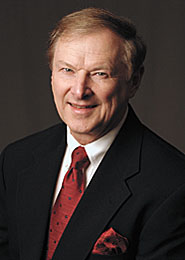  |
| HOME | THIS ISSUE | CALENDAR | PTR | BACK ISSUES | < BACK | NEXT > |
Audiology professor receives top award in field
by Cindy Weiss - April 16, 2007
|
||||
| He is one of the world’s top audiologists, the “father” of neuroaudiology, and the developer of three of the four major tests for central auditory processing disorders. Now Frank Musiek, professor of audiology and director of auditory research in the Department of Communications Sciences, is being recognized with the James Jerger Career Award for Research in Audiology, the field’s highest award. He will receive it April 19 at the American Academy of Audiology meeting in Denver. Musiek, who joined the faculty of the College of Liberal Arts and Sciences six years ago, also is professor of otolaryngology at the School of Medicine. He came to UConn from Dartmouth Medical School, where he had been director of audiology at Dartmouth-Hitchcock Medical Center (DHMC) since 1975, after earning his Ph.D. in audiology and neurophysiology from Case Western Reserve. Musiek says his research boils down to a simple question: “How well does the brain understand what the ear is telling it?” He has contributed to a fundamental understanding of the anatomy, physiology, and neurophysiology of the human auditory system, and his work has shaped the preferred practice methods in audiology clinics around the world, according to the Jerger award nomination. Musiek’s research into how brain disorders affect hearing is closely tied to his clinical experiences, and his teaching is closely tied to his research. A fellows program that he started at Dartmouth has mentored more than two dozen audiology professionals, who have all become successful in their field. One of them is Jane Baran, chair of the Department of Communication Disorders at the University of Massachusetts-Amherst. In nominating Musiek for the award, she wrote, “He was always willing to share his knowledge, expertise, and excitement about audiology, not only with me, but with all of the DHMC fellows, and he now is doing the same with his students at UConn.” He has an exceptional ability to effectively transfer his research findings into clinical practice, she adds. At UConn’s Speech and Hearing Clinic, where Musiek still sees patients, people travel from all over the Eastern seaboard with unusual disorders that they want him to evaluate, says Professor Carl Coelho, head of the Department of Communications Sciences. Recently, Musiek even had a patient travel here from Denmark. He says in order to learn about central auditory problems, you have to see patients clinically. His expertise attracts graduate students to UConn’s audiology program, says Coelho. The program last fall was again ranked 22nd in the country of the 74 graduate programs that offer the AuD clinical audiology doctorate. Musiek helped develop the AuD degree program at UConn, which accepted its first students in 2004.
The type of disorder that is Musiek’s specialty is often misdiagnosed. Patients with a central auditory processing disorder may pass a conventional hearing test, even though they feel that they are not hearing properly, because a standard hearing test will not detect their problem. At Dartmouth, when he was looking for patients with Multiple Sclerosis to study, Musiek called an officer of the MS society, who told him that she wanted to be his first subject because she had difficulty hearing. It turned out she had a severe central auditory processing disorder. “A lot of doctors don’t even know that MS can cause hearing loss,” Musiek says. He was able to help the woman with a desktop assistive listening device connected to her ear by an ear bud receiver, which amplified what she was hearing. As many as 2 percent to 3 percent of school-age children diagnosed as learning disabled may actually have central auditory hearing disorders, he says. Teachers and parents are gradually becoming aware that the typical school hearing test may not find the problem. Musiek and others are working on new, more sophisticated tests for schools that would detect the disorder. Adults with a central auditory hearing disorder may be told they have a cognitive or psychological problem. Or, they may develop a central hearing loss from a head injury, Alzheimer’s disease, AIDS, or a stroke. Finding the cause of their hearing loss is “almost a detective problem,” Musiek says. Once he finds it, the problem may be helped by training the auditory system to perform better. Patients can do repetitive auditory exercises, listening to recorded sounds so they learn to recognize, discriminate, and sequence sounds and speech signals. “We can’t help them if we can’t diagnose them,” he says. Musiek developed four clinical tests, three of which are considered mainstays in central auditory testing. He’s one of the top five audiologists in the world, says Coelho. James Jerger, an icon in the field who is now at the University of Texas at Dallas, has high praise for the colleague who will win the award named for him. “Frank is a nationally and internationally acclaimed scientist whose contributions have earned him an enviable position in the community of hearing scientists,” he wrote in support of Musiek’s nomination for the award. “He can be justly described as the father of neuroaudiology.” |
| ADVANCE HOME UCONN HOME |

